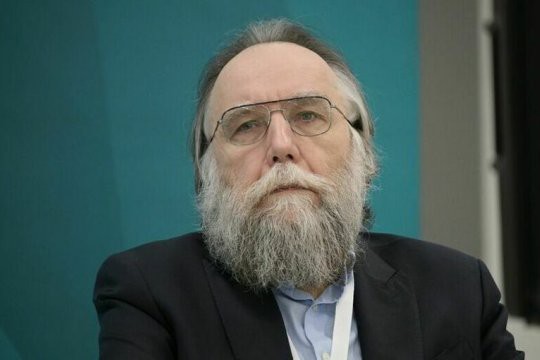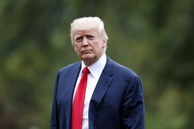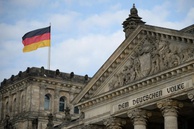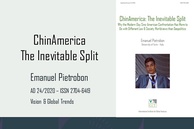Realism in International Relations
There are two main schools in the theories of International Relations – Realism and Liberalism.
The Realists believe that humans are prone to vice by nature (the legacy of the anthropological pessimism of Hobbes, or, to be more exact, the repercussions of the Christian concept of lapse from virtue – lapsus in Latin) and that it is impossible to radically mend it. This means that egoism, embezzlement and violence are ineradicable. The conclusion that follows is that if we want to contain or discipline a human being (who, according to Hobbes, lives by the principle ‘dog eats dog’), we can do it only by means of a powerful state. The state, which is inevitably considered a carrier of supreme sovereignty, reflects the predatory and selfish human nature, so a national state has its own interests. These interests are taken into account only by the state, while will to violence and greed make it possible to wage an open war. This was the case and will be the case at all times, the realists say. International Relations are thus built on the balance of strength between utterly sovereign entities. There can be no long-lasting world order, what exists is chaos, which takes different shapes as some nations weaken, others strengthen. The concept of “chaos” does not bear any negative connotation in this context – it all but states the way things are, proceeding from the most serious approach to the idea of sovereignty. If there exist a few truly sovereign powers, there can be no supra-national order between them to which everyone would report. Should there be such an order, sovereignty would not be complete, or rather, it would not exist at all, and it would be the very supra-national instance alone that would maintain sovereignty.
The School of Realism is traditionally strong in the USA, starting from its founders – American scientists Hans Morgenthau and George Kennan, and British theorist Edward Carr.
Liberalism in International Relations
The Realists are opposed by the Liberals, who lean not on Hobbes with his anthropological pessimism, but on Locke, with his concept of man as blank slate (tabula rasa) and, partially, on Kant, with his pacifism, resulting from morality of practical mind and its universal nature. The Liberals in International Relations believe that man can be corrected through disciplining and re-training. This is what is meant by the Enlightenment project: to transform the predatory egoist into the reasonable and tolerant altruist, ready to reckon with others and be sensible and tolerant to them. Hence, the theory of progress. If the Realists claim that human nature is incorrigible, the Liberals argue that it is liable to correction and should be corrected. Both the former and the latter assume that man is descended from a monkey. The Realists hold this as an undisputable fact (man-dog), while the Liberals are sure that the society as the power to change the very nature of a former beast and write whatever needed on its “blank slate”.
If so, the functions of the state boil down to enlightenment only and once the society becomes liberal and civil, the state can be dissolved. Sovereignty thus carries nothing absolute – it is but a temporary measure. If the state does nothing to transform its subjects into liberals, it becomes evil. Only a liberal state can exist, as “democracies do not fight against each other”.
However, these liberal states should gradually die out, clearing the way for the World Government. Having laid the foundation for a civil society, they are abolished. A gradual abolition of this kind is undoubtedly progressive. This the logic we are witnessing in the present-day European Union. The American globalists, including Biden, Obama, or “open society” advocate George Soros, point out that in the course of such progress the World Government will be formed on the basis of the USA and its direct satellites – this is what the League of Democracies project is all about.
Technically, liberalism in International Relations, which is set against realism, is often referred to as “idealism”. Realists in International Relations believe that the humanity is doomed to remain the way it has always been, while liberals in International Relations “idealistically” believe in progress, that it is allegedly possible to change human nature. Gender theory and post-humanism are part of this ideology – they come from liberalism.
Marxism in International Relations
Another trend in International Relations is Marxism. In this context, “Marxism” is not quite what underlay foreign policy in the USSR. Realism classic in International Relations, Edward Carr, proved that Soviet foreign policy – first of all, under Stalin – hinged upon the principles of pure realism. In his practical steps Stalin proceeded from complete sovereignty, which he associated not only with a national state, but mostly with his “Red Empire” and its interests.
What is known as “Marxism in International Relations” is mostly presented in Trotskyism, or the world system theories by I.Wallerstein. This is “proletarian” idealism.
Here, the entire world is viewed as one single zone of social progress, as a result of which the capitalist system should become global. In other words, it all boils down to establishing the World Government, with the hegemony of world capital, which is international by nature. Here, the human essence, just as the Liberals claim, depends on the society, or to be more exact, on relation to ownership of production means. Thus, human nature depends on class. While the society abolishes the beast in man, it transforms it into a social mechanism, fully dependent on the structure of the class. Man does not live and does not think, through him lives and thinks the class.
However, unlike liberalism in International Relations, Marxists in International Relations believe that history will not come to an end with the formation of the World Government and complete integration of human race without states or cultures. After that (but not before, which is where it is at odds with the Soviet system, with "Stalinism”) class contradictions will reach their culmination and the World Revolution will take place. Here, the mistake of Stalinism is the attempt to build Socialism in one country, which leads to the left version of National Socialism. Only after capitalism completes its mission of exterminating states and abolishing sovereignties, an international proletarian revolution will be possible. Until then, it is necessary to support capitalism, first of all, mass migration, human rights ideology, all kinds of minorities, in the first place, sexual.
Contemporary Marxism is mainly like this: pro-liberal, globalist and accelerationist.
Realism in Multi-Polar World Theory
The question is: what is the Multi-Polar World Theory closer to? Realism or Idealism?
I would like to emphasize that a key figure in the theory is not the classical bourgeois national state of the New Time (in the format of the Westphalian system and the Machiavelli-Bodin sovereignty theory), but а civilization state (Chang Wei-Wei) or the “Big Spaces” (K.Schmitt). A profound sketch of such a multi-polar world order was made by Samuel Huntington in the early 90s of the 20th century. A few civilization states, having completed regional integration processes, become independent world policy hubs. This is the subject of my “Multi-Polar World Theory”.
At first glance, the Multi-Polar World Theory mentions sovereignty, which means realism. True, but there is an important reservation: here, the bearer of sovereignty is not just a national state, which is a constellation of separate individuals, but a civilization state, which brings together peoples and cultures under the patronage of the supreme horizon – religion, historical mission, the ruler idea (like in Eurasia). A civilization state is a brand-new name for Empire, Chinese, Islamic, Russian, Ottoman, and of course, Western. Such civilization states determined the balance of planetary policy in pre-Columbian era. Colonization and elevation of the West in the New Time has changed this balance in favor of the West. Now, we are witnessing a certain historical correction. The non-West is yet again making itself felt. Russia is battling with the West in Ukraine for control of a major limitrophe. China is competing for dominance in global economy. Islam is waging a cultural and religious jihad with western imperialism and hegemony. India is growing into a full-fledged global entity. The resource and demographic potential of Africa is making it a de facto major player in the near future. Latin America too is declaring the right to independence.
The new entities – civilization states and so far merely civilizations, ever more reflecting on their integration in sovereign powerful blocs, “big spaces”, are considered new figures of planetary realism.
But, unlike ordinary national states, established on the patterns of European bourgeois regimes of the New Time, civilization states are invariably something much bigger than the accidental unification of aggressive egoistic beasts, as western realists see the society. Unlike ordinary states, a civilization state builds around a mission, an idea, a system of values, which have not only practical and pragmatic qualities. This means that we cannot apply here in full the principle of realism, which does not take into account this ideal dimension. We thus deal with idealism which is radically different from the liberal one, since liberalism is the dominating ideology of only one civilization – western. All the rest, being unique and relying on their own traditional values, are oriented at other concepts. For this reason, we can describe the idealism of rising non-western civilizations, which shapes a multi-polar world, as illiberal.
Civilization states in the Multi-Polar World Theory simultaneously incorporate elements of both realism and liberalism in International relations.
From realism they borrow the principle of absolute sovereignty, the absence of any obligatory instance at planetary level. Every civilization is fully sovereign and does not report to any World Government. Therefore, there exists conditional “chaos” between civilization states, like in classical realism theories. But, unlike these theories, we deal with a different entity -–not with a national state, designed on the principles of European New Time, but a completely new system, leaning on autonomous concepts of man, God, society, space and time, resulting from the specifics of a concrete cultural code – Eurasian, Chinese, Islamic, Indian, etc.
This kind of realism can be described as civilizational, it builds not on the logic of Hobbes, which explains the existence of Leviathan by the originally evil and aggressive nature of man-beasts, but on the beliefs of large communities united by tradition (often sacred) in the supremacy of ideas and standards which they consider universal. This universality is limited by the “big spaces”, that is, the boundaries of a specific Empire. Inside such a “big space” it is recognized and is constitutional. This is what its sovereignty is based on. But in this case, it is not egoistic and material, but sacred and spiritual.
Idealism in Multi-Polar World Theory
Idealism is present here in full. This is not the idealism of Locke or Kant, since there is no universalism, no concept that there are certain “panhuman values”, which are common to all and for the sake of which we must sacrifice sovereignty. This idealism of civilizations is far from liberal, it is illiberal. Each of these civilizations is confident about the absoluteness of its traditional values, and all of them are noticeably different from what the contemporary globalist West offers. The religions differ, the anthropologies differ, the ontologies differ. And the political science, which boils down to the American political science, where everything builds on the opposition of “democracies” and “authoritarian regimes”, is just crossed out. Idealism is present, not in favor of liberal democracy, as “the purposes and peaks of progress”. The ideal is different in each civilization. Somewhere it has nothing to do with the western one. Somewhere it is similar, but only partially. This is what illiberalism is all about – the arguments of the contemporary western liberal civilization as a universal model are rejected and replaced with own system of traditional values depending on the civilization – Russian, Chinese, Islamic, Indian etc.
In the case of civilization states, idealism is related to a specific Idea, which reflects the purposes, the basics and orientations of this civilization. Here, we talk about not just reliance on history and the past, but about a project which requires concentration of efforts, willpower and a substantial intellectual horizon. This Idea has a nature which is different from a simple overview of national interests, which is typical of realism. The presence of a supreme (in a sense, transcendental) purpose determines the future, the path of development in accordance with what each civilization considers good and chooses to follow in its historical context. Just as in liberal idealism, we talk about a desire to follow the appropriate, which determines the purposes and means of progressing into the future. But the ideal here is radically different: instead of extreme individualism, materialism and improvement of the solely technical sphere of society, which the liberal West is trying to assert as a panhuman criterion but which de facto reflects only the historical and cultural trend of the post-modern West, each of the non-western civilizations puts forward its own form. This form may well contain a claim to become universal, but unlike the West, civilization states acknowledge the legitimacy of other forms and respect them. A multi-polar world begins with the recognition of the Others, which are near and whose interests or values may be different. Multi-polarity acknowledges pluralism of Ideas and ideals and recognizes the right of the Others to existence and difference. It is this that underlies the conflict between unipolarity and multipolarity.
The liberal West proceeds from the fact that the entire humanity has only one ideal and only one direction for development – the western. Everything that is typical of the Others, what does not coincide with the identity and values of the West is viewed as “hostile”, “authoritarian” and “illegitimate”. At best, it is seen as “lagging behind”, which needs correction. Thus, in practice, liberal idealism in its globalist format coincides with cultural racism, imperialism and hegemony. Civilization states in a multi-polar model contrast this “ideal” with their own concepts and orientations.
The version of illiberal Idea
Russia has traditionally tried to treat continental Eurasian empire as relying on the values of collectivism, solidarity, justice and Orthodox tradition. This is a fairly different ideal. Quite illiberal, if we are to agree to how contemporary western liberalism defines itself. The Russian civilization (the Russian world) has its own universalism, which makes itself felt in the universal nature of the Orthodox Church, and, during the Soviet period -–in the belief in the victory of socialism and communism on a global scale.
The Chinese project “Community of Common Destiny” (人類命運共同體)» by Xi Jinping or the theory Tian Xia (天下) embody the large-scale version of the traditional Confucian ideal of Celestial Kingdom, the Chinese Empire, which is in the center of the world and which offers the other nations the Chinese cultural code as an ethical, philosophical and socio-political ideal. But the Chinese dream – both in its Communist and openly anti-bourgeois, anti-individualistic version, and in its traditionally Confucian format, is very far in its fundamentals from western liberalism, and is, in fact, illiberal.
The Islamic civilization has its own unshakable principles and is oriented at disseminating Islam on a global scale – as the “last religion”. Considered normal for this civilization is the establishment of socio-political system on the principles of sharia and loyalty to fundamental religious postulates. This, in turn, is an illiberal project.
India has been turning more and more often in the past decades to the basics of the Vedic civilization – in part, to the system of castes (varnas), to the liberation from the colonial models of philosophy, and to the assertion of Hindu principles in culture, education, politics. India too, views itself as the hub of global civilization and its tradition – as the summit of human spirit. Indirectly, this becomes visible through the spread of simplified Proselytist forms of Hinduism – such as yoga and spiritual practices. Apparently, Vedanta philosophy has nothing in common with the principles of liberal globalism. For a traditional Hinduist, the contemporary western society is witnessing the extreme form of degradation, confusion and the turning of all traditional values upside down, which is typical of the dark age – Kali Yuga.
The African continent is producing its own civilization projects, most often in the form of Pan-Africanism. Underlying them is the anti-western vector and the urge of the indigenous people of Africa to turn to their pre-colonial traditions. Pan-Africanism has several branches, which practice different interpretations of the African Idea and the ways of its implementation in the future. But all of them unanimously reject liberalism, which means Africa too, is following the path of illiberalism.
The same is characteristic of countries of Latin America, which are keen to identify their differences from both the USA and Western Europe. The Latin American Idea builds on the mixture of Catholicism (fading or fully extinct in the West, but fairly active in South America) and the revived traditions of autochthonous peoples. This is yet another instance of civilizational illiberalism.
Clash of civilizations – battle of Ideas
As a result, the Russian, Chinese and Islamic Ideas bear a pronounced universal potential. Next comes India, while Africa and Latin America are so far keeping their projects within the boundaries of the corresponding continents. Although the wide spread of Africans worldwide causes some theoreticians to think of creating – first of all, in the USA and EU – African autonomous self-governed zones on the principle of Brazilian Quilombo. The growth of Latin American population in the USA might in the future produce a considerable influence on the North American civilization and the dominant system of values, which, by virtue of Catholic foundation and the surviving links to traditional society, could sooner or later come into conflict with liberalism, which has Protestant and clearly visible Anglo-Saxon roots.
For this reason, the battle between unipolar and multi-polar world orders represents the clash of Ideas. On the one hand, there is liberalism, which is trying to defend its domineering positions on a global scale, while on the other hand, there are several versions of illiberalism, which is getting ever more visible in countries of the multi-polar bloc.
The opinion of the author may not coincide with the position of the Editorial
read more in our Telegram-channel https://t.me/The_International_Affairs

 14:04 02.07.2024 •
14:04 02.07.2024 •



























